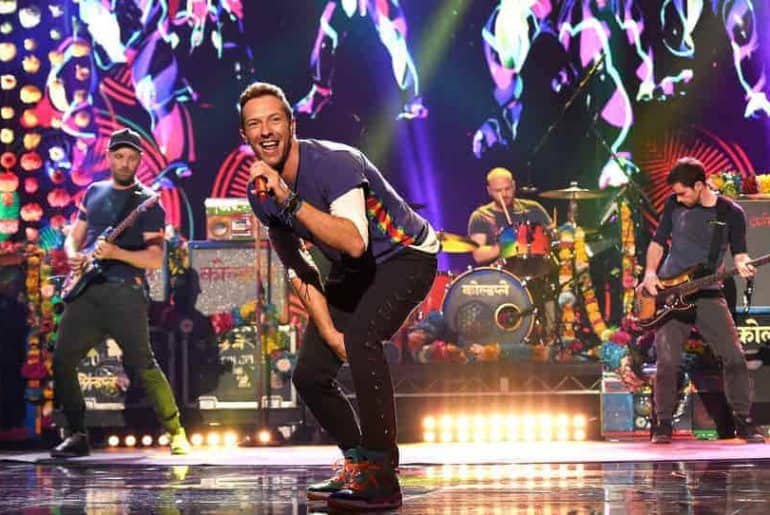The uproar surrounding the upcoming Coldplay concert sheds light on a bigger problem in the music industry. This article delves into the implications of such events on ticketing practices, fan experiences, and the evolving landscape of live entertainment in a digital age.
With the announcement of Coldplay performing in Mumbai in 2025, a frenzy gripped the Indian audience. Advertisements popped up on social media, influencers made reels hyping it up, and news channels made it their headlines. It came to be known as THE event of 2025 and became THE topic of conversation of current times.
Coldplay, being a band that Gen Z and Millennials grew up listening to, thus holds a special place in the lives of many. Their songs strike the strings of nostalgia in the hearts of people. The music video of their song “Hymn For The Weekend” being shot in India has further cemented their connection with the country.
People eagerly counted down the days for when the tickets would be sold. They had set up their devices, waiting for the clock to chime twelve when the tickets would go live. The excitement had been palpable as fans anticipated this crucial moment, fully invested in securing their chance to see the beloved band live. However, that enthusiasm was short-lived and soon gave way to disappointment and frustration.
The BookMyShow site crashed even before the tickets went live. People were stuck in long queues lasting hours; queues that did not seem to be moving in any particular order. People who managed to make it through the queue and select the seats had their site crash during payment. Tickets sold out within minutes. Almost immediately they were found being sold for increased prices at reselling sites.
In a recent conversation with DU Beat, a diverse group of individuals stepped forward to share their personal experiences,
“I had reached my turn and even though tickets were shown to be available, there was no option to choose from. Whether it was a glitch or scalping, it was really disheartening since I had been planning and saving up for the concert.”Said Diya.
“I logged in from two devices at the same time but both had the queues moving at different paces. My brother logged in from his device much later than me but was placed ahead in the queue. A friend of mine logged in and instead of being placed in the queue, was immediately taken to the payment window.” Said Navya.
“We were given four minutes to book the tickets. I had chosen the tickets, entered all the details and clicked to confirm payment when it showed that no more tickets were available.” Said Siddharth.
“I started the queue at around 73000 and around 61000 the entire stadium was sold out. This is mathematically impossible, even if each person had bought the maximum allowed four tickets.” Said Aadya.
The Economic Offences Wing of Mumbai Police has issued summons to BookMyShow’s CEO Ashish Hemrajani and its technical head. This comes after advocate Amit Vyas filed a case of fraud against BookMyShow.
BookMyShow has released a statement addressing the sale of unauthorised tickets,
“BookMyShow has no association with any ticket selling/reselling platforms such as Viagogo and Gigsberg or third-party individuals to resell Coldplay’s Music Of The Spheres World Tour 2025 in India. Scalping is strictly condemned and punishable by law in India. We have filed a complaint with the police authorities and will provide complete support to them in the investigation of this matter. We urge you to not fall victim to these scams. Any tickets bought from unauthorised sources will be at the risk of the consumer, and can turn out to be fake tickets. Beware of such scammers.”
These reselling sites have often been in legal disputes over not supplying tickets, supplying counterfeit tickets, and selling the same ticket to multiple people. They have also received legal notices and heavy criticism over selling charity tickets for profit.
The discourse surrounding Coldplay’s concert provides a concerning commentary. In a hyper-capitalist world, concerts no longer remain a cherished experience between fans and their idol, or a joyful gathering for people to enjoy. Instead, they turn into cash cows, highly commercialised and commodified events driven by profit maximisation. Concerts have shifted from music to market, becoming the centre of a growing money-making landscape, many of the practices ranging from unethical to illegal. What was once a celebration of music has now transformed into a spectacle of consumerism.
It would be incorrect to say that concerts never had a commercial aspect to them, after all, it is a service, and the artists and organisers deserve to be paid fairly for providing it. What has changed, however, is the shift from compensation to exploitation. Ticket prices aren’t just high enough to cover costs, they are inflated for maximum profit. The focus is no longer on providing an experience for the fans, the very people responsible for putting the artist on the stage, but on creating more and more ways to extract money from them. With even basic amenities like drinking water and access to bathrooms being monetized, something that can lead to health problems for the attendees, concerts are increasingly viewing fans as mere wallets to tap into.
Even when tickets start at an affordable price, like at the Coldplay concert, they are immediately bought by resellers and scalpers and sold at exorbitantly inflated prices. The tickets ranging from ₹2,500 to ₹35,000 are being resold for more than 10 lakhs, representing a more than 2000% increase from the original price.

The chaos surrounding the Coldplay concert indicates a larger, troubling trend in the music industry, casting doubt upon the spirit of live music in the future. Can concerts remain shared celebrations of art and music, or will they be transformed into purely commodified events and exploitative enterprises?
Read also: Global Citizen Festival: Highlights
Samriddhi

